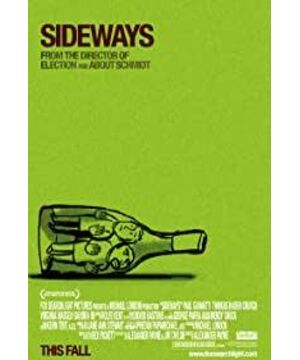Production Country: USA
Production: Fox Searchlight
Director: Alexander Payne
Screenplay: Alexander Payne Jim Taylor
Starring: Paul Giamatti Thomas Hayden ChurchVirginia • Mai Desen
type: Comedy
Running time: 123 minutes
movie Appreciation:
work system • Alexander Payne was called in holding a small scalpel cutting the American dream. His film is delicate and light, but compared with his first three works, "A Life with Wine" shows rare restraint, which may be related to the theme of the film. As a film about the crisis of middle age, the director may hope that the characteristics of the middle-aged person should be reflected in the style of the film.
The film won the Oscar for best adapted screenplay that year. The success of such a small-cost film is obviously due to the author's attention to people. The fixed styles of independent films such as no stars, relatively simple scenes, and plain stories are well used, making the film an exquisite film focusing on the delicate emotions of small characters. Payne focused his attention on middle-aged men, drawing on the most common classes in American society. On the American screen full of American heroes, robots, and incomprehensible people, the occasional appearance of small people is bound to give people a bright and comfortable feeling. If the function of Hollywood movies is to create a wonderful American dream for the American people, then this film is really a scalpel that gently scratches some marks in this beautiful dream. The desolate group of middle-aged men is the constant interest of filmmakers from all over the world. However, this film has an American film flavor that cannot be stripped away.
The film uses prose-style narrative methods to promote the narrative with details. The travels of the two male protagonists Miles and Jack constitute the main line of the film's narrative, and the English title "sideways" ("side by side") is derived from this. The destination of this trip is a winery in the wine country Senta Babara. The film naturally uses wine as an important metaphorical prop, supporting another clue of the film. Career, love, woman and wine, as the most important keywords in the life of middle-aged men, support the humanistic care of this film.
These are two men who are facing difficulties in their careers and love. One loses love and can't get out of the shadows; the other is about to enter the love grave, in extreme panic. One is a middle school teacher whose career has never been satisfactory and the writer's dream is far away; the other is a dead actor who is no longer brilliant. Between them covers all the dilemmas of a lost middle-aged man in career and love. This is a stage when a man is going astray, what he has is facing or has been lost, and what he has not gained is basically hopeless. Their lack of self makes them urgently need to find their own value, so the wine tasting journey between Miles and Jack is more like a journey of dignity to find the identity of others. As a rare wine tasting expert, Miles can only find a sense of authority when tasting. After he learned that the publication was hopeless, his first reaction was to go to the wine tasting area to make trouble. When he found that the identification he needed most was not obtained, the virtual or meaningless identification suddenly became absent in Miles' view. Worth it. For Jack, wine is only a tool for him to seduce women, and his glorious past has become his endless chatter. He constantly helps others to recall a certain role he starred in to obtain comforting satisfaction. Enjoy the popularity of the past in the cheers of others. The author's highly functional and ingenious setting makes the film have a certain kind of thinking tension, which increases the film's capacity and at the same time weakens the film's power. If the movies of the life flow can't reproduce the flow of life itself in a sensual way, but adopt some kind of argumentative approach, while increasing the typicality, it also loses the influence of the audience.
For love, this typicality is even stronger. Two men directly represent two, and they may be the only two middle-aged men who do differently when facing emotional dilemmas. Miles, who has been divorced for two years, has not yet come out of the shadows. He is determined to have a chance to reconcile with his ex-wife. He is obviously a person living in hopeless hope. I hope to reunite with my ex-wife and the manuscript to be published, but as all viewers imagined, the two are completely lost. The ex-wife is married to another wealthy man, and the manuscript is hopeless to be published. Myers’ new love actually stems from his search for identity. Myra, who also understands the wine culture, talks to him and stimulates his hormone secretion. And Myra's recognition of his manuscripts eventually prompted him to embark on an unpredictable path to find love. This is a possibility for a downhearted man to belong to his love. His lost self-esteem is awakened, which prompts him to give away his own feelings. In other words, he fell in love with this woman who identified with him while being identified. This is an anti-romantic remark, but it is definitely from human nature. What a man hopes to get from a woman is not only physical pleasure, but also a sense of conquest and identification. For Miles, he found this kind of recognition, which evokes a certain physical aspect of him. need. In the film, it was directly shown that he bought pornographic magazines. The setting of this functional detail became a sign of Miles' emotional thaw.
Jack is a middle-aged man with a strong sexual desire. He is about to marry a rich daughter. He will get a mansion and the glory of the second half of his life. But as a man, this actually constitutes the most serious humiliation. To be precise, Jack's journey seems to be enjoying the last happiness before marriage, but in fact he is looking for a sense of conquest. He is unwilling to admit that he has expired and that he already needs to rely on marriage in exchange for a living. This impulse to conquer led to his hunger for women. The progress with Daphne was rapid, and when Miles and Myrashan were discussing their lives, the two were already in bed. Jack claims that he is in love with Daphne, wants to live with her, or even give up his marriage. This seemingly irrational decision is in fact well-founded. In this relationship, Jack's sense of conquest is far greater. Jack's marriage, Jack found dignity and tried to give up life. However, the reason of the middle-aged man made him quickly return from the wrong path, and eventually returned to his marriage. This choice is a necessity of life and does not require any moral judgment. Jack was beaten to death by Daphne and expelled from the naked body by having an affair with a married man. It may represent the director's attitude, but after filming this The film facilitated the divorce of his Korean wife, perhaps representing the director's attitude in a deeper sense.
If the author appears to be too clever in the character setting, then the film's use of wine is too cumbersome. As far as narrative is concerned, the dark line composed of wine does not constitute too much connection with the main line of travel, and has little effect on the plot. It is more like the "discussion" component in a prose with narration and discussion. The author gives wine a significant metaphorical effect, and relies on the mouth of the person in the play to tell the truth straightforwardly. With a wine glass, Myra and Miles began to discuss the similarities between wine and life. While the author's intention was to get a clear view, it also weakened the audience's pleasure in watching the movie. The reason why the film is slightly inefficient and sluggish in narrative is because the visual presentation of the film's metaphor for wine is obviously weak. Domestic film critics often talk about the film's "propaganda work" about wine, thinking that "even if it is not a film, it can be regarded as a good popular wine film", which is simply inexplicable. The author has the urge to use this important prop, but lacks the ability of filming.
Even so, the film abandons the strict pursuit of the law of causality in Hollywood movies, and uses the prose-style dramas of life flow to connect the trivial matters of life during travel in a flat and smooth manner. There is no cause and effect between these fragments, as if it is a natural trajectory of life. This is commendable in the industrialized America. Drinking, tasting, chatting, picking up girls, and making love have become the themes of the lives of these two men, giving the work a kind of affinity and dramatic tension of life itself, and the blues music throughout the story makes the taste of life permeate the film. Make it light, humorous, and even frivolous. The frivolity is because the film’s social criticism is insufficient, and the author has the urge to pay attention to American society. He pays attention to small people, looks through the ordinary people in the highly developed American industrial society, discusses human nature, and focuses on people. He set Miles's work to be unpublished because he "doesn't meet market needs", and he set Jack to be a former American pop drama star. Obviously, he had his thoughts in it. Impetuous pop culture quickly eliminated generations of celebrities, but the old traditional civilization could not get the attention of the society. The attitude expressed by the author was obvious. He placed his last hope on Miles and let him embark on a journey of rebirth. To fight for his love and let Jack return to mediocrity, it is no wonder that some commentators say that this film is calling for the "return of traditional values." But obviously the author's presentation is from an elite standpoint. He has not invested himself in the life of the character he wants to show, or that this kind of revelation is just a stalemate. This is a common problem in American movies. Avoid or pat social reality lightly. Why did the crisis arise? Where did it come from? While the film reveals that the protagonist’s struggle is hopeless and desolate, it also has to give the ending an inexplicable hope. So where does the hope come from?
David Lynch swung his big sword into the illusion of the American Dream. While he smashed it, he laughed at Alexander Payne's small knocks. The film critic Jonathan Blobaum also helped: "Even though he turned one way. Seeing a problem, I have never been able to give an answer, whether it is due to poverty, old age, class, politics or other social dimensions."
View more about Sideways reviews











